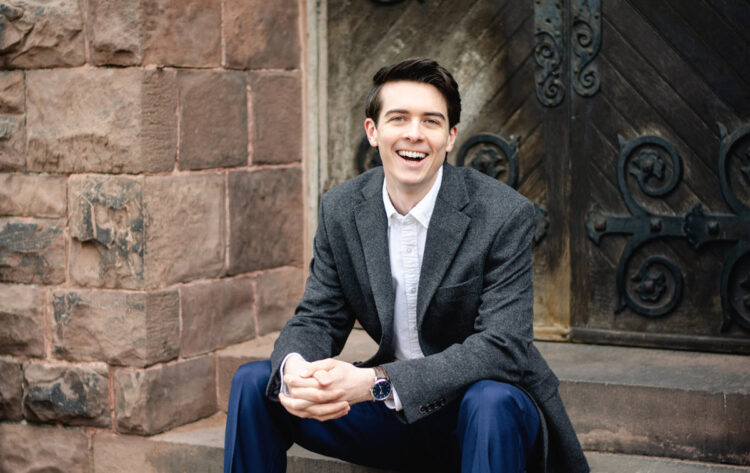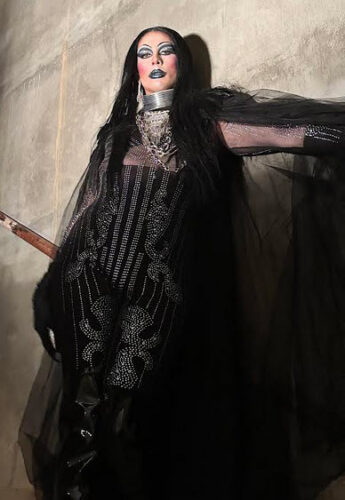by Michael Galvin
Published February 26, 2024
‘Those of us who present in ways incongruous to conventional expectations spend much of our lives explaining ourselves’

Back home in Boston, while unpacking my suitcase full of makeup, brushes, hip pads, and tangled wigs from recent performances of Dido and Aeneas with the Atlanta Baroque Orchestra, I discovered that I was unpacking something else: a sense of pride that I had never before felt in my career.
Never before had I packed that much stuff into a suitcase for a gig but, more importantly, never before had I packed that much of myself into a performance. I’ve been an opera singer for nearly a decade and a drag queen for three years. Outside of self-produced cabarets, these two identities had not “officially” crossed paths on the opera stage, and while they remained separate, I did not feel whole.
The kinds of roles written for my voice type, as an operatic bass, have never fit the roles that have excited me as a stage performer. It’s why I’ve been so drawn to early music — the farther back one goes in history, the more the lines blur between what is prescribed and what is possible. I don’t find that level of carte blanche in many other classical music spaces. And so, in a post-pandemic world that permitted me to experiment, I asked myself the question: What would happen if I sang the music and dressed the part of the divas that I always dreamed of portraying?

My first real moment of validation that I was doing something more than playing dress-up came at the end of a cabaret I produced in 2022. The concert was in a queer bar, so audiences could eat and drink while they watched. I was in drag and told a story through monologues to help weave together my set list of arias, art songs, and musical theater chestnuts.
A young person came up to me after the show and said they had never seen classical music performed. They felt that an opera house or symphony hall had no place for them because they never saw anyone like themselves inside. But this concert was as close to their community as I could get because I’m a part of their community.
After seeing Donatella Fermata, my 6’9” operatic diva of a drag persona, they were eager to buy a ticket to a real opera because they finally experienced it in a place that felt like home. They felt a door had been opened to say, “Welcome, there’s space for you here, too.” By inspiring this one person to feel empowered to explore the world of opera, I felt like my mission had been achieved: to show people that there is space for us all in music and art, no matter the venue, the style, the gender, or the experience level.
Hearing comments like the one I received after my cabaret makes me proud to do what I do: I’m making a tangible impact on my industry and my community through authentic connections with new audiences. I’ve struggled writing this essay because I want so badly to avoid using this platform as an explanation or defense. Queer people, especially those of us who may present in ways incongruous to conventional expectations, spend much of our lives explaining ourselves. In many conversations about my integration of drag in opera, I find myself jumping to try and squash the assumption that I’m trying a gimmick. I think that’s why so many of us in the LGBTQIA+ community gravitate toward theater — it’s an opportunity for us to simply be someone without having to defend who we are.
That’s why my performances as the Sorceress in Dido and Aeneas, earlier this month, was such a relief. The Atlanta Baroque Orchestra and the contemporary dance troupe Staibdance incorporated my drag in a way that never felt sensational. At every turn, the intention was clear: I was there to help tell a story, and the story would be enhanced by the Sorceress being in drag. Indeed, the performance history of the Sorceress has long been gender-blurry, like many characters in operatic history from the endearing title character in Rameau’s Platée to the frisky Cherubino in Mozart’s Le nozze di Figaro. But what happens when we step beyond costuming and think about gender-bending as a lived experience?
I have been in too many rehearsal spaces afraid to be me because my expression of my queerness might deride the seriousness of the “art” that we were there to make. What a breath of fresh air it was to be able to bring my whole self into a rehearsal space and, ultimately, performances.
As I reflect on my journey thus far, I find myself amused. If you had told me as an 18-year-old music major that my part in this career would look like this — donning stilettos and a catsuit to sing a role with a professional Baroque orchestra — I would not have believed you. Because I, like my audience member at the cabaret, didn’t believe that there was a space for this in opera — for play, for imagination, for queer joy. It took me a long time to understand my place in this art form and I continue to learn more with every new gig I travel to, every new colleague I meet, and every new story I try to tell. My hope is that, regardless of how we engage with it, whether on stage or in the audience, opera is a place where we can see ourselves. Opera can challenge us in many beautiful ways but as long as I’m able to perform, it will never be a drag.
Bass Michael Galvin is a Boston-based classical singer and drag performer who seeks to champion the work of queer creators in classical music. Recent engagements include the Boston Early Music Festival, the Kennedy Center, and your local divey drag bar.

